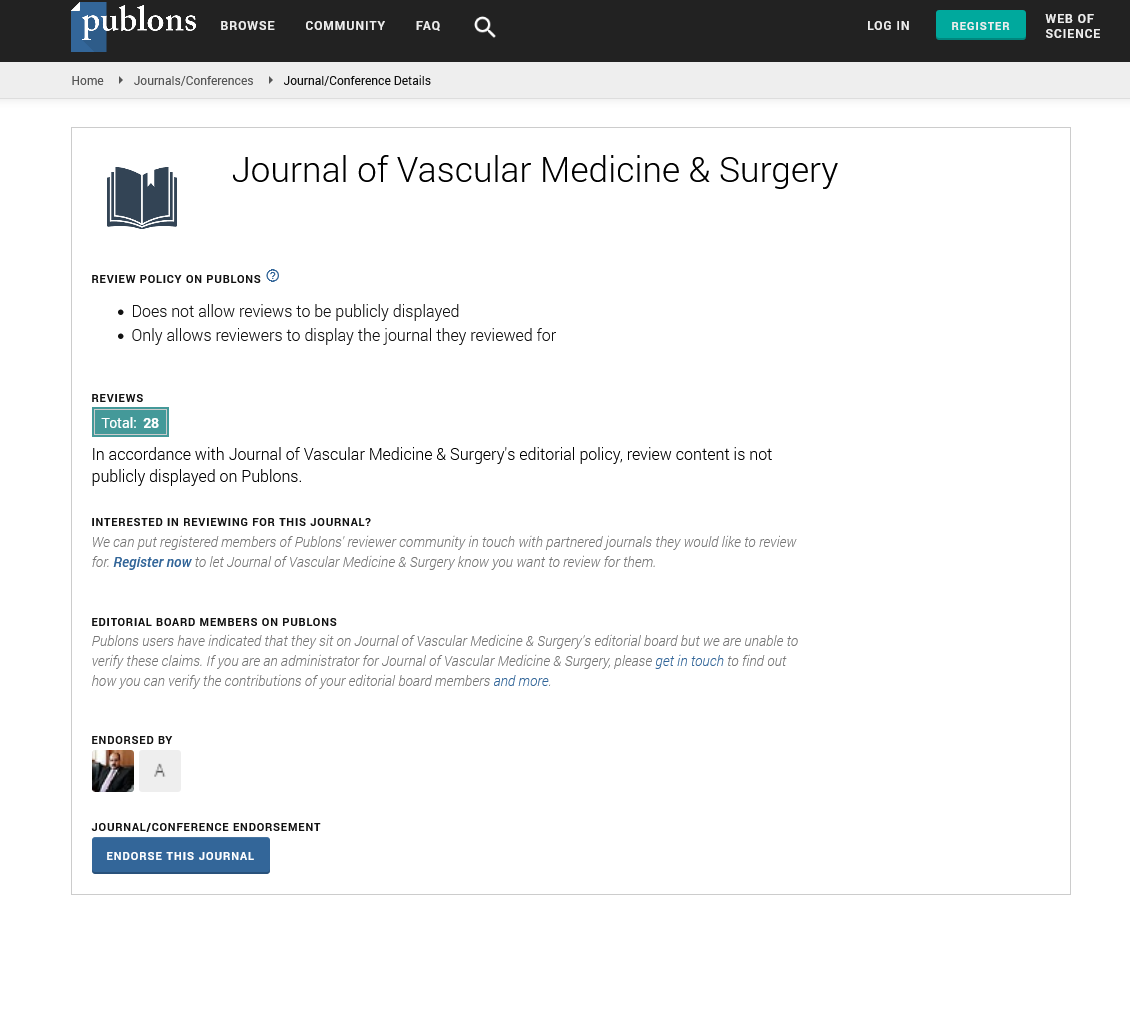Indexed In
- Open J Gate
- Academic Keys
- RefSeek
- Hamdard University
- EBSCO A-Z
- OCLC- WorldCat
- Publons
- Euro Pub
- Google Scholar
- SHERPA ROMEO
Useful Links
Share This Page
Journal Flyer

Open Access Journals
- Agri and Aquaculture
- Biochemistry
- Bioinformatics & Systems Biology
- Business & Management
- Chemistry
- Clinical Sciences
- Engineering
- Food & Nutrition
- General Science
- Genetics & Molecular Biology
- Immunology & Microbiology
- Medical Sciences
- Neuroscience & Psychology
- Nursing & Health Care
- Pharmaceutical Sciences
Commentary Article - (2023) Volume 0, Issue 0
Evaluation of Heart Disease and its Function
Diller Gumbiene*Received: 04-Apr-2023, Manuscript No. JVMS-23-21326; Editor assigned: 06-Apr-2023, Pre QC No. JVMS-23-21326 (PQ); Reviewed: 21-Apr-2023, QC No. JVMS-23-21326; Revised: 28-Apr-2023, Manuscript No. JVMS-23-21326 (R); Published: 08-May-2023, DOI: 10.35248/2329-6925.23.S15.514
Description
Heart disease is commonly referred to as cardiovascular disease; it is a medical condition that affects the heart and blood vessels. Heart disease is the most common cause of death around the world. Every year approximately 18 million people suffer deaths as a result of coronary artery disease. The condition is caused by an accumulation of plaque in the arteries, which can cause difficulties that prevent blood flow to the heart, brain, and other vital organs.
Causes of heart disease
Heart disease can be caused by a wide range of factors, including genetics, lifestyle determinations, and other medical conditions. The following are some of the most common causes of cardiovascular disease:
High blood pressure: High blood pressure is also known as hypertension, it can damage the arteries and increase the risk of heart disease.
High cholesterol: High levels of cholesterol in the blood can cause the development of plaque in the arteries.
Smoking: Smoking can damage the blood vessels and increase the risk of cardiovascular disease.
Diabetes: It can damage the blood vessels and increase the risk of Heart disease.
Obesity: Obesity improves the risk of heart disease by causing additional stress on the heart.
Family history: A family history of heart disease can increase the probability of developing the disease.
Symptoms of heart disease
Cardiovascular disease symptoms can vary depending on the type and severity of the condition. Some of the common symptoms of heart disease include:
Chest pain or discomfort: It is one of the most common symptoms of heart disease. It can appear to be a squeezing, pressure, or burning sensation in the chest.
Shortness of breath: Shortness of breath can occur with exertion or at rest, and may be an indication of heart failure.
Fatigue: Fatigue is a common symptom of heart disease, and may be caused by a lack of oxygenated blood to the body.
Swelling: Swelling in the legs, ankles, or feet may indicate heart failure.
Irregular heartbeat: An irregular heartbeat, or arrhythmia, can be symptoms of heart disease.
Prevention of heart disease
There are several lifestyle changes that can help to prevent heart disease, including:
Avoid smoking: It can reduce the risk of heart disease.
Exercising regularly: Regular exercise can help to prevent heart disease by reducing the risk of high blood pressure, high cholesterol, and obesity.
Managing stress: It can increase the risk of heart disease as a result, it is important to identify methods to manage stress, such as through meditation or yoga.
Managing medical conditions: Managing medical conditions such as high blood pressure, high cholesterol, and diabetes can help to prevent heart disease.
Treatment methods of heart disease
The treatment methods of heart disease depend on the type and severity of the condition. Some of the most common treatments for heart disease include:
Lifestyle changes: Lifestyle changes, such as eating a healthy diet, exercising regularly, and a voids smoking, can help to manage heart disease.
Medications: Medications such as blood thinners, and betablockers can help to manage heart disease.
Medical procedures: Medical procedures such as angioplasty, stenting, and bypass surgery can help to treat blockages in the arteries.
Implantable devices: Implantable devices such as pacemakers and defibrillators can help to regulate the heartbeat.
Citation: Gumbiene D (2023) Evaluation of Heart Disease and its Function. J Vasc Surg. S15:514.
Copyright: © 2023 Gumbiene D. This is an open access article distributed under the terms of the Creative Commons Attribution License, which permits unrestricted use, distribution, and reproduction in any medium, provided the original author and source are credited.

